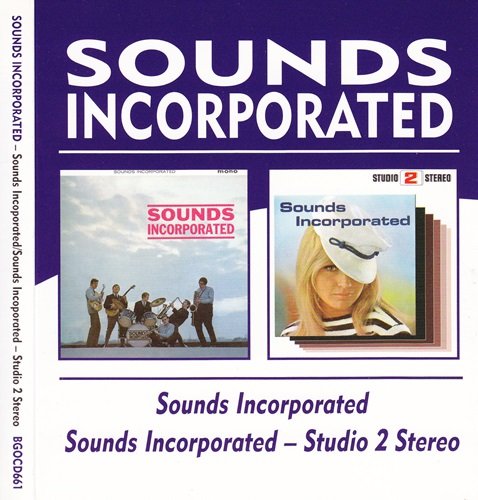
Sounds Incorporated - Sounds Incorporated / Studio 2 Stereo (2005)
BAND/ARTIST: Sounds Incorporated
- Title: Sounds Incorporated / Studio 2 Stereo
- Year Of Release: 2005
- Label: BGO Records
- Genre: Pop Rock, Instrumental
- Quality: Flac (tracks)
- Total Time: 01:02:34
- Total Size: 441 Mb (scans)
- WebSite: Album Preview
Tracklist:
01. William Tell 2:06
02. Fingertips 2:25
03. I'm In Love Again 2:17
04. Rinky Dink 2:07
05. Bullets 2:37
06. Last Night 3:02
07. Sound Like Movin' 2:02
08. One Mint Julep 2:42
09. Ready Teddy 1:24
10. Crane (Theme From TV Series) 2:03
11. Maria 2:28
12. Light Cavalry 2:53
13. Goldfinger 2:17
14. Little Bird 2:01
15. If We Lived On Top Of A Mountain 2:19
16. Grab This Thing 2:33
17. Yesterday 2:29
18. Boil Over 2:45
19. What Now My Love 3:15
20. Zorba's Dance 3:24
21. Bahama Sound 3:10
22. On The Rebound 2:36
23. The Old And The New 1:57
24. Legend Of Lyndos 2:56
25. Twilight Of An Empire 2:44
01. William Tell 2:06
02. Fingertips 2:25
03. I'm In Love Again 2:17
04. Rinky Dink 2:07
05. Bullets 2:37
06. Last Night 3:02
07. Sound Like Movin' 2:02
08. One Mint Julep 2:42
09. Ready Teddy 1:24
10. Crane (Theme From TV Series) 2:03
11. Maria 2:28
12. Light Cavalry 2:53
13. Goldfinger 2:17
14. Little Bird 2:01
15. If We Lived On Top Of A Mountain 2:19
16. Grab This Thing 2:33
17. Yesterday 2:29
18. Boil Over 2:45
19. What Now My Love 3:15
20. Zorba's Dance 3:24
21. Bahama Sound 3:10
22. On The Rebound 2:36
23. The Old And The New 1:57
24. Legend Of Lyndos 2:56
25. Twilight Of An Empire 2:44
A six-man, all-instrumental rock & roll combo, Sounds Incorporated was one of the first British rock groups to do more than imitate Cliff Richard's backing band the Shadows, and wound up supporting a number of legendary artists while landing a few British hits in their own right. Formed in 1961 in their home area of northwestern Kent, the band included saxophonists/woodwind players Alan "Boots" Holmes and "Major" Griff West (born David Glyde), organist/pianist/baritone saxophonist Barrie Cameron (born Baz Elmes), guitarist John St. John (born John Gillard), bassist Wes Hunter (born Dick Thomas), and drummer Tony Newman (born Richard Anthony Newman). They gigged extensively on a local basis and occasionally played London as well, where they quickly made an impression as one of the few British rock & roll bands led by a horn section. Early on, they backed visiting American rockers like Gene Vincent, Little Richard, Jerry Lee Lewis, and Sam Cooke (among many others), learning the artists' repertoires before their arrival in the U.K. They soon got an opportunity to record with the legendary producer Joe Meek, and in 1963 released several singles on Decca. They also began traveling to Hamburg to entertain American servicemen; there they played the famous Star Club and met and befriended the Beatles. Late in 1963, Beatles manager Brian Epstein signed Sounds Incorporated to his company; the following year, the group not only became singer Cilla Black's regular backing band, but also toured the world as the Beatles' opening act, and released their self-titled debut album (plus several more singles, including an arrangement of "William Tell" that topped the charts in Australia) on Columbia.
During the mid-'60s, they augmented their own recordings with numerous gigs on the U.K. ballroom circuit and plenty of session work; they also landed a fairly sizable hit with an arrangement of "Hall of the Mountain King." A second album, also (confusingly) titled Sounds Incorporated, appeared on the Studio Two label in 1966; the following year, the Beatles invited Cameron, Holmes, and West to be the saxophone section on their Sgt. Pepper track "Good Morning, Good Morning." The same year, however, Newman left to pursue a full-time session career and was replaced by Terry Fogg; Cameron also departed to become an arranger and manager, and his place was taken by Trevor White, who gave the group its first vocalist. As the circuit for traditional-style rock & roll shifted from ballrooms to more upscale cabarets, Sounds Incorporated landed better-paying gigs and used the money to travel to Australia in 1969 and play extensively around Sydney. In 1971, they finally called it a career; some remained in Sydney, while others returned to England and took low-profile, music-related jobs.
During the mid-'60s, they augmented their own recordings with numerous gigs on the U.K. ballroom circuit and plenty of session work; they also landed a fairly sizable hit with an arrangement of "Hall of the Mountain King." A second album, also (confusingly) titled Sounds Incorporated, appeared on the Studio Two label in 1966; the following year, the Beatles invited Cameron, Holmes, and West to be the saxophone section on their Sgt. Pepper track "Good Morning, Good Morning." The same year, however, Newman left to pursue a full-time session career and was replaced by Terry Fogg; Cameron also departed to become an arranger and manager, and his place was taken by Trevor White, who gave the group its first vocalist. As the circuit for traditional-style rock & roll shifted from ballrooms to more upscale cabarets, Sounds Incorporated landed better-paying gigs and used the money to travel to Australia in 1969 and play extensively around Sydney. In 1971, they finally called it a career; some remained in Sydney, while others returned to England and took low-profile, music-related jobs.
Instrumental | Pop | Oldies | Rock | FLAC / APE
As a ISRA.CLOUD's PREMIUM member you will have the following benefits:
- Unlimited high speed downloads
- Download directly without waiting time
- Unlimited parallel downloads
- Support for download accelerators
- No advertising
- Resume broken downloads


